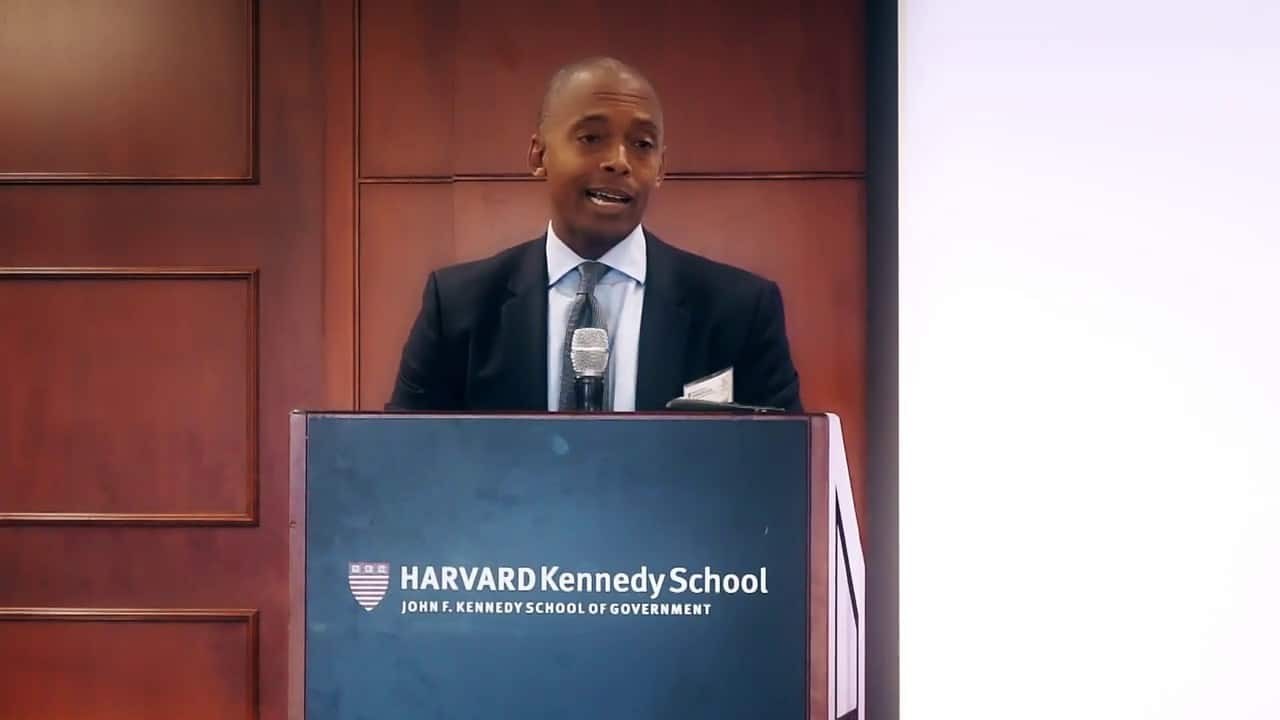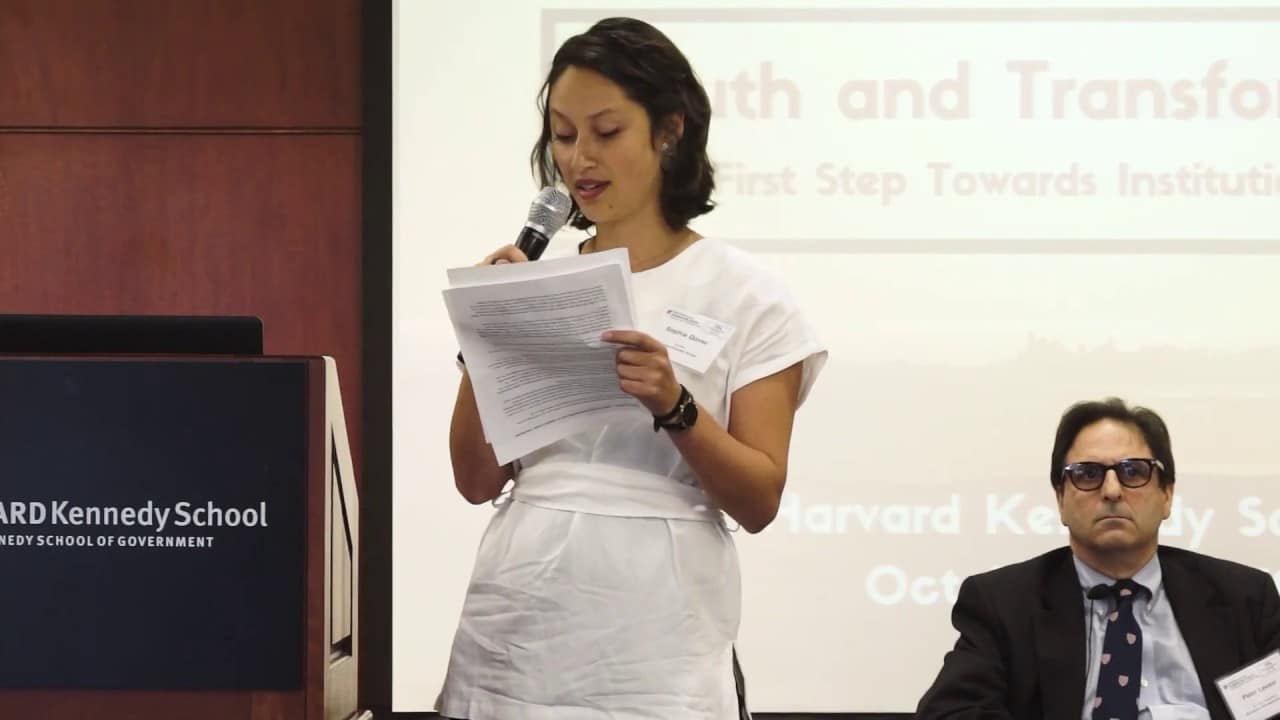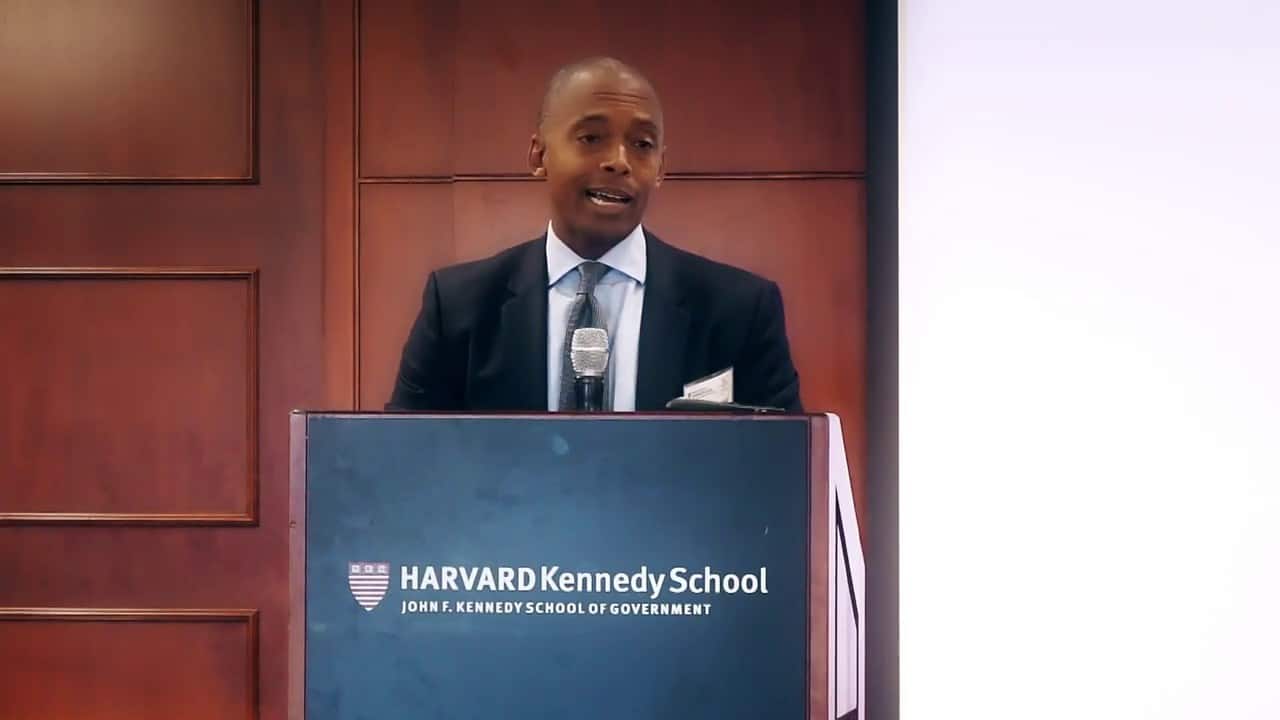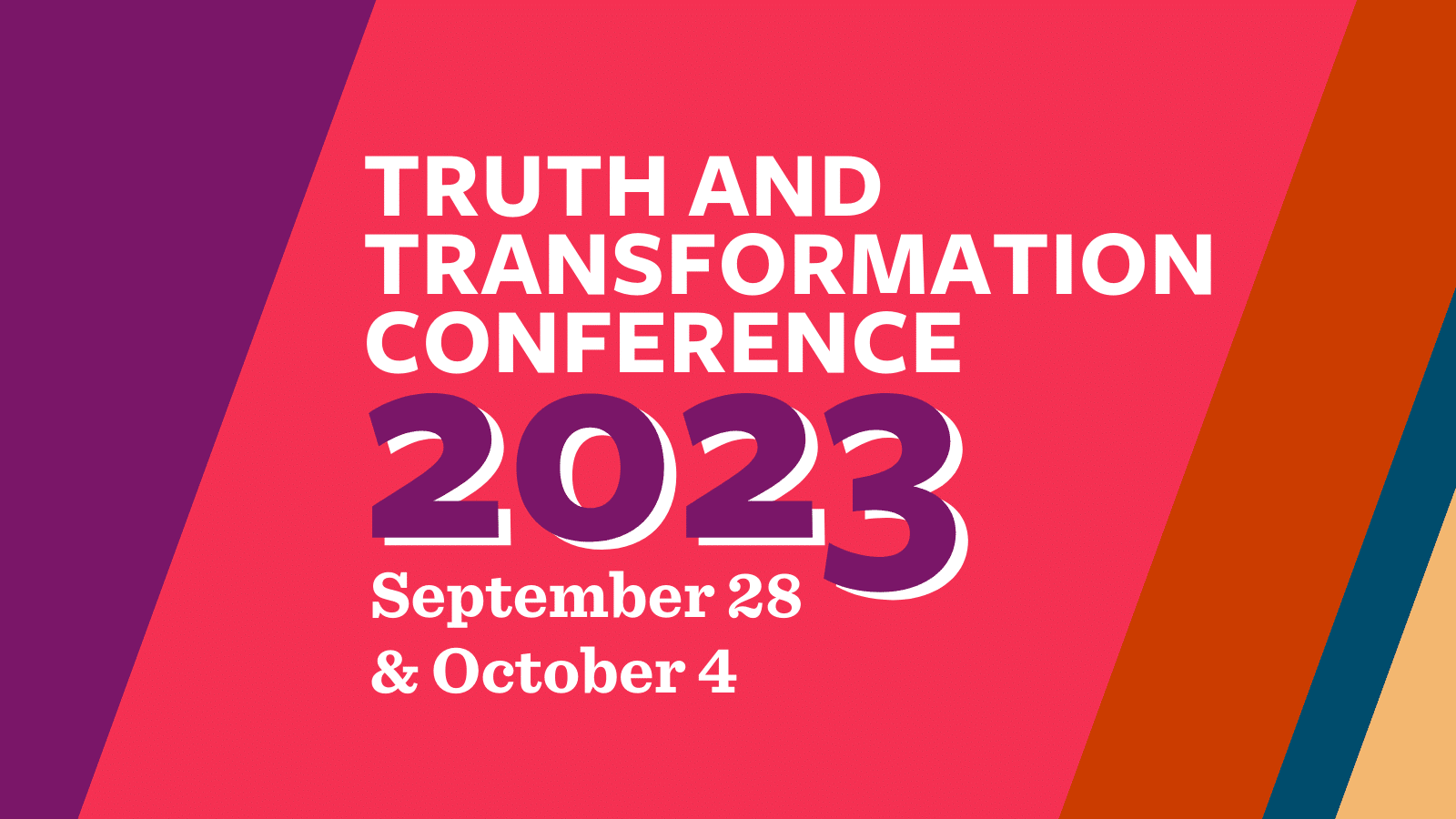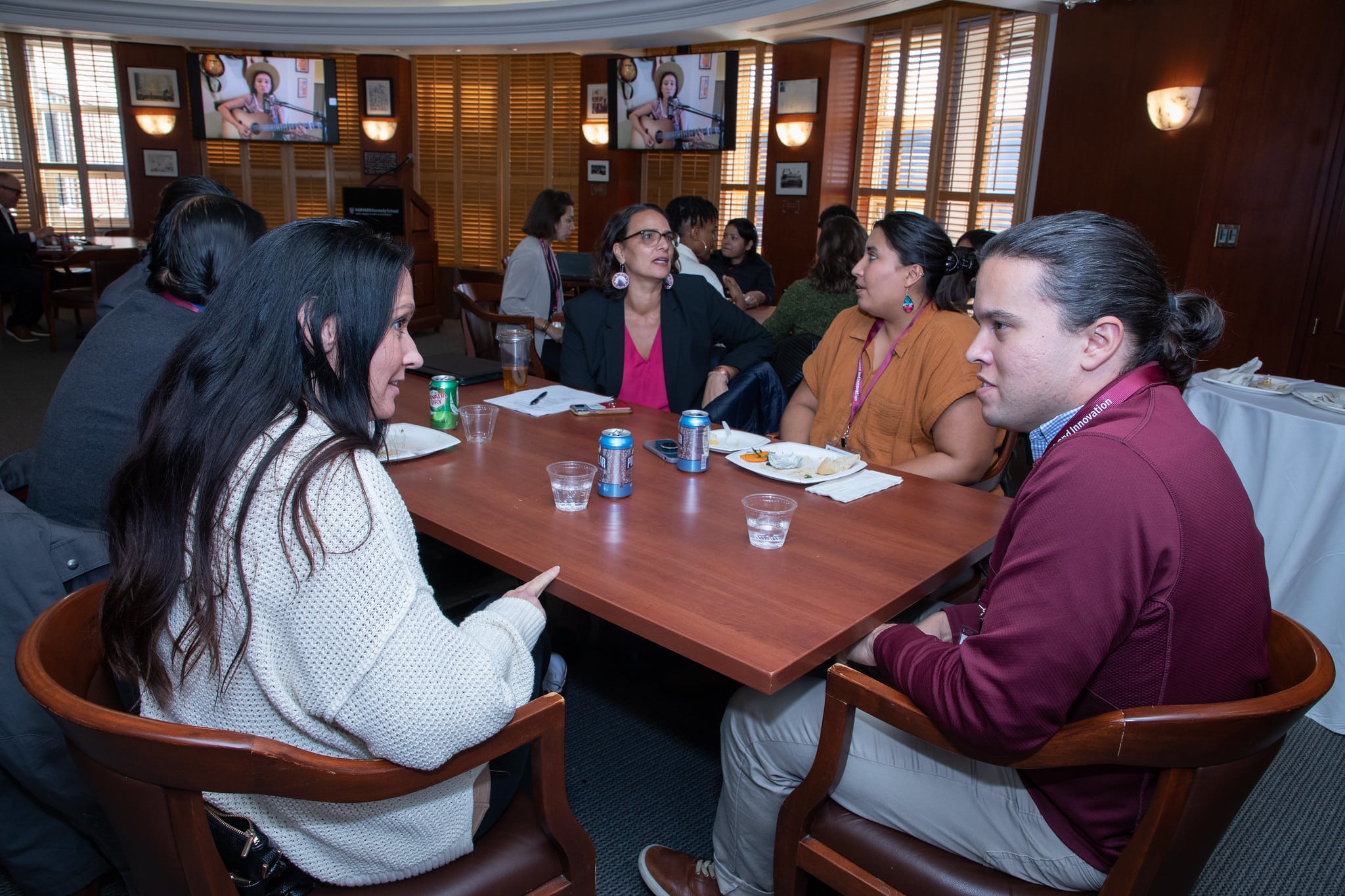Truth and Transformation Conference 2019
October 16, 2019
On October 16, 2019 The Institutional Anti-racism and Accountability (IARA) Project hosted the inaugural Truth and Transformation convening. Our intent was to use the October convening to explore and examine how understanding and engaging with institutional history impacts organizations when forging a path forward for equity. Please read more below for a recap of the convening and text, video, and audio excerpts.
Thank you to the Open Society Foundations for providing funding for the convening. The conference program, including participant bios, can be found here.
Conference Overview
On October 16, 2019, The Institutional Anti-racism and Accountability (IARA) Project hosted the first annual Truth and Transformation Convening. The convening explored how an examination of institutional history can provide incentive, support, accountability and a more equitable framework for organizations seeking to adopt anti-racism as a core principle.
The conference registered nearly 200 attendees, and speakers and panelists came from all parts of the country. Dr. Khalil Gibran Muhammad, Faculty Director of the IARA Project, provided opening remarks that compellingly set the imperative of historical reckoning as prologue to progress in racial equity (see transcript below). The first testimonial, by student Sophie Dover of the Harvard Kennedy School (HKS), provided an honest and raw look at the power of truth-telling within an institutional context (a video of her remarks is posted on the website). This was followed by an impressive presentation from Dr. Mary Bassett, The TH Chan/Harvard School of Public Health, describing her racial equity focused leadership while Commissioner of Health for New York City. Next came a panel discussion by HKS alumni ranging from the 1970’s to currently enrolled students, recounting their experiences with inequity and exclusion while attending Harvard (panelists listed below). This candid and moving discussion laid the groundwork for a conversation about organizational transformation. A panel of professionals from the racial equity field shared their challenges and successes with work in this arena and this discussion was bookended by two insightful testimonials from Addys Castillo and Justin Freitas from the People’s Institute For Survival and Beyond and Beth Chandler, of YCWA Boston. The day concluded with the remarks of Nick Turner, Director of the Vera Institute. Mr. Turner’s dedication and determination to recognize the need for, and to lead racial equity transformation at a highly respected and public-serving organization provided critical end-of-the-day inspiration for the Convening’s attendees.
Highlights and summaries of the panels, keynotes, and testimonials are presented in this multi-media recap, including a podcast interview of Ms. Castillo and Mr. Freitas from the People’s Institute.
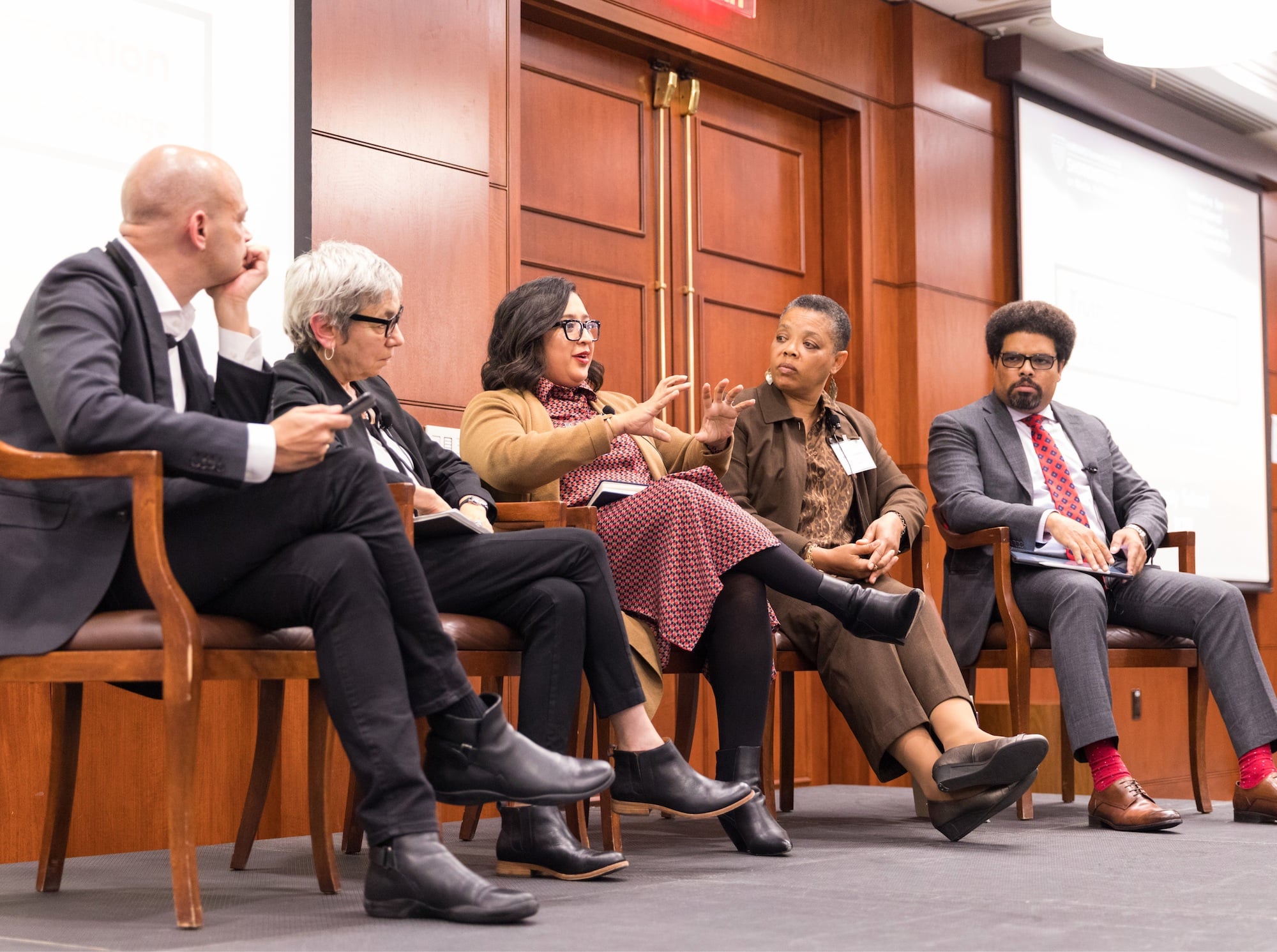
Opening Remarks
Khalil Gibran Muhammad, Ford Foundation Professor of History, Race, and Public Policy at Harvard Kennedy School, Director, IARA Project:
“Truth telling is a form of active accountability.” Dr. Muhammad said, setting the stage for the day’s discussions. “No pathway to recovery for the individual victim of trauma or substance abuse, nor for any society steeped in histories of racism and colonialism can heal, repair, and transform without reckoning with its past.”
“Between individuals and societies are institutions that are the bedrock of civil society and bind the me and the we together. It is that work within our institutions, across every sector—private, public and not-profit—that the IARA Project aims to address.”
He emphasized that we, as a society, teach students to see racism as an artifact of the past. “America may have defeated slavery but we have not defeated the narrative of racial difference.” We continue to focus policies and resources on fixing ‘broken people’ instead of dismantling ‘broken systems’ he pointed out. Despite inequality being one of the fundamental moral, political and economic challenges of our lifetime, professional schools across the spectrum do not require competency in the study of race. HKS is no exception – the study of race is offered only as an elective – and diversity among both faculty and students continues to come up woefully short, explained Dr. Muhammad. “If truth is the pathway to a better America – who has the responsibility of telling it?” he asked.
“Racism is a cancer in our society and we need to employ the same standards of diagnosis, treatment and prescriptive practices,” said Dr. Muhammad. “What politicians won’t do, and individuals can’t do, our institutions must do.
Read Professor Muhammad’s full remarks here.
Opening Testimony
Sophie Dover, a Masters in Public Policy candidate, provided a testimonial on her experiences as a student at HKS. A video clip of her full testimonial can be found below.
Ms. Dover described how, in her view, HKS is “missing an opportunity to better educate future world leaders.” She provided examples of how students felt excluded and harmed by both the lack of support and responsiveness of faculty and administration at HKS on topics of race and diversity and were offered false equivalencies between political differences and lived racial oppression. She concluded her remarks by saying “Harvard has failed me, it has given me a lack of racial history, I am not being challenged, I am not being held accountable.”
Opening Keynote
Dr. Mary T. Bassett, the Director of the FXB Center for Health and Human Rights at Harvard University, as well as the FXB Professor of the Practice of Health and Human Rights at the Harvard School of Public Health.
Read Dr. Bassett’s opening remarks here.
Panel #1 Truth:
Racism And Institutional Change Through The Years
Participants: George Cheung, Peter Levavi, Shaniqua McClendon, Cynthia Silva Parker, Akina Younge (Moderator)
This panel of HKS alumni was the first ever convened to specifically address the topic of institutional racism and bias in the curriculum, administration, and experiences of students of color. The panel featured HKS alumni describing their tenure at Harvard and how their course work prepared or failed to prepare them as policy makers in their careers.
Click here to read a summary of the panel with HKS Alumni.
Testimonial #2
Addys Castillo And Justin Freitas
People’s Institute For Survival And Beyond
Addys Castillo and Justin Freitas provided testimony of what opportunities and obstacles are faced by community organizers working in racial equity.
Click here for a recap of their testimonial.
Panel #2 Transformation
Anti-Racist And Structural Change From The Outside In
Participants: Jazmin Chavez, Glenn Harris, Frances Kunreuther, Karla Nicholson, Darrick Hamilton (Moderator)
This panel detailed best practices of organizations that have adopted a racial equity or anti-racist core value. Recommendations were provided by representatives from organizations that have embraced such practices, as well as those that have trained institutions to do this work.
Click here to read a summary of the panel with leaders engaging in institutional change.
Testimonial #3
Beth Chandler, YWCA Boston
Beth Chandler started her testimonial with a quick fact-based assessment of the racial inequality that prevails in Boston. Citing statistics that show little to no progress in black law firm partners, the numbers of black and Latin X faculty and students at Boston Universities, and a yawning wealth gap for the median net worth for white families ($240,000) compared to black families ($8) in the Boston area. “Most folks are one paycheck away from poverty. When we talk about organizing, what people have at stake is important to recognize.”
Beth described how the mission of the YWCA is explicit: to eradicate racism and sexism. She follows the prescription that gaining support from 30 percent of an organization will create a tipping point. Change requires leadership and support from the 30 percent. The medicine required to inoculate an organization against racism comes from data, storytelling and empathy. If one can identify a gap, and find an upstream intervention, then the data can help to tell the story; and the story can create empathy; and empathy can move people to make effective changes. But even with changes, Beth asserted, one has to be transparent and honest with what is and what isn’t working. She also emphasized that many nonprofit and government programs are still focused on “fixing broken people” and not on addressing the systemic causes of discrimination in race and gender. A recognition of where the problems originate and building more broad coalitions of support is needed to lobby for system-wide and governmental reform.
Closing Keynote
Nick Turner, President & CEO, Vera Institute For Justice
Truth And Transformation
The evening keynote focused on the imperative role that truth and transparency has for organizational transformation. Mr. Turner has been leading a reformation at the Vera Institute, a 40-year old organization focused on building and improving justice systems that ensure fairness, promote safety, and strengthen communities. Mr Turner explained the dichotomy he saw when he first considered the position of leading Vera: Vera had a long history of fighting racism but had also worked in and with systems that sustained disparities. Mr. Turner recognized that it was time to consciously realign Vera’s priorities to work at dismantling racist systems. Even at this venerable institution where justice has always been a core value, he saw the need to reassess and redirect with a focus on concrete changes but also on an intentional shift of ideas and ideals.
Mr. Turner called this work “forever work” and work that has to recognize the history that has led to the current conditions. They initiated their reform by empowering employees to design a new project within each group aimed at racial equity – they invested in the ideas of their employees and their clientele to create action plans. Some of the steps that Vera has taken in reform are:
- Creating research and data analysis that is both quantitative and qualitative and is participatory with those living and working in prisons.
- Hiring formerly incarcerated people and investing in their leadership.
- Using the narrative of art and storytelling to humanize the issues and cultivate broader bases of support.
- Recognizing the history that led up to and sustains the current dehumanizing justice system.
- Reimaging prison and the prison system – taking lessons from more humane forms of justice and incarceration in Europe.
- Democratizing the organization and conducting racial equity and inclusion work that is supported by leadership but driven by colleagues and staff. This requires a redistribution of power in the organization not rooted in historical norms.
- Leveraging community support and collaborating with outside groups to build power, transparency and accountability.
- Targeting resources to the commitment, including $1.0 million annual allocation to the best ideas emanating from non-supervisory staff.
Closing Remarks
Professor Khalil Gibran Muhammad, Professor of History, Race And Public Policy, Harvard Kennedy School, Director IARA Project
“What does a little bit of change look like? Brown University – Ruth Simmons. Brown has had an anti-racist commitment, taking money away from things that seemed sacrosanct and creating an infrastructure dedicated to truth telling.”
Dr. Muhammad wrapped up the proceedings by highlighting some of the most important lessons of the day: the importance of community building and community voices and not feeling isolated and alone in doing this work, that commitment to diversity and inclusion is not sufficient for a commitment to anti-racism; that organizations committed to liberal ideals or philanthropy still may be upholding racist systems; that history of an organization and the larger history of this country matters and no transformation can be authentic without a reckoning and a reasoning of how that history is entwined in the structures of an organization; that new ideas, ideals and ways of being transparently accountable are all critical for anti-racist work; that the work is fueled by the passions of those who are encouraged to tell their stories and to have their voices heard; that real change requires committed leadership, creativity and redirection of resources to support the ideals of equity and justice.
“Most of us go someplace every day that can either lift us up or tear us down. I hope we have given you a roadmap of how to do this work and not feel alone.”
Podcast
IARA Research Assistant Erica Licht, HKS MPA Candidate, sat down with Justin Freitas and Addys Castillo from People’s Institute for Survival and Beyond (PISAB) after the conference to talk about PISAB’s innovative approach to structural inequality and anti-racism training.
Panels and Presentations
You May Also Be Interested In


